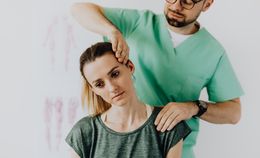The practice of acupuncture dates back millennia. It originated in China over two thousand years ago and is deeply connected to a health philosophy called Traditional Chinese Medicine (TCM).1
Despite its longstanding and authoritative position in Eastern health practices, however, acupuncture has only recently begun to gain credibility in the US as a treatment for serious medical conditions. The past several decades have seen a surge in new medical studies documenting the positive health benefits of acupuncture. More insurance companies are choosing to include acupuncture as part of their treatment plan coverage - and more people are willing to pay out-of-pocket for the treatment, too.2
Why are so many people catching on to the impressive benefits of this ancient approach to health and wellness? And what exactly can acupuncture do for modern patients? Before we dig into the details, let's step back and review some basics.
How does acupuncture work?
According to Traditional Chinese Medicine, a life force called qi or chi (pronounced 'chee') flows through the human body along lines called meridians. Illness is thought to result from an imbalance or blockage in these energy flows.3 To restore vitality and health, your acupuncturist will insert thin, hairlike needles into the surface of the skin along these meridians. They will then pluck or twirl these acupuncture needles, or perhaps apply a mild electric pulse to them. This will often stimulate a slight muscle twitch, but the experience is otherwise painless. (Remember - these stainless steel acupuncture needles are very thin and are inserted only slightly into the skin.)
Your acupuncturist may leave the acupuncture needles in your skin for anywhere from 5 to 30 minutes, depending on the specific treatment. During this time, you simply lie still and relax. For many people, this is a very calming and peaceful time which is similar to meditation. Your acupuncturist will then remove the needles and - unless further treatment is needed - conclude your acupuncture session.
Although this is the basic and most commonly-known technique, a certified acupuncturist will also be skilled in Chinese herbal medicine and may prescribe a range of herbs as part of your treatment plan. Your acupuncture session may also involve other techniques to manipulate the energy flow in your body, including massage, moxibustion (heat therapy), and cupping.4
Proven Benefits of Acupuncture
It may seem hard to believe that such a simple form of treatment could have such a major, positive impact on your health. Fortunately, a wealth of scientific medical research has shown that acupuncture provides unmistakable health benefits for a range of issues - some of which may be very surprising. Here are five of those impressive results:
1. Acupuncture alleviates chronic pain
Chronic pain is a widespread and debilitating health issue for over 50 million Americans - about 20 percent of the population.5 People afflicted by this condition can suffer tremendously, may become unable to work, and often see a serious detriment to their mental health.
But here's the good news: According to a 2018 study, acupuncture is an effective treatment for chronic pain.6 That includes back and neck pain, shoulder pain, chronic headache, and osteoarthritis. The study also found that the results were long-lasting, and could not be explained away by the placebo effect. Again, to put it simply: If you're treating chronic pain, acupuncture works.
2. Acupuncture eases menstrual cramps
Most women - up to 95 percent, according to some studies7 - experience pain and cramps with their periods. This has a serious, negative impact on quality of life, with a third of women saying period pain interferes with their normal, daily activities8 and 40 percent reporting that it affects their ability to work.9
While many women resort to over-the-counter pain medication to deal with these menstrual cramps, acupuncture and Chinese herbs have been proven even more effective than Tylenol for pain relief.10 According to a 2019 study, the effectiveness of acupuncture was proven for 91% of women with period pain, compared to 73% effectiveness for Tylenol. Another study in 2017 found that acupuncture can reduce the duration and intensity of period pain by up to 50%11 - a hugely significant health outcome.
3. Acupuncture helps Carpal Tunnel Syndrome
Carpal Tunnel Syndrome (CTS) is a condition afflicting the fingers and hands of many office workers. Due to the repetitive motion of typing, the median nerve (which runs the entire length of your arm) becomes pinched in your wrist, where it runs through the so-called 'carpal tunnel'. This nerve impingement can cause numbness, tingling, and pain in your hands and fingers. The effects can range from mildly annoying to seriously debilitating and can lead to lost work in many carpal tunnel sufferers.
Fortunately, according to a 2017 study, acupuncture is a promising first-line treatment for carpal tunnel syndrome.12 The study tested 80 people with mild to moderate carpal tunnel and gave them either real acupuncture electro-treatment or a "sham" treatment. The people who received real acupuncture showed more pain relief than the placebo group. They also showed a fascinating "remapping" of the part of the brain that monitors and responds to carpal tunnel pain. Even at a 3-month follow-up, people who received real acupuncture treatment "were more likely to report sustained or continued improvement in functionality - and in symptoms like pain, numbness, and tingling - than those who didn't." Another similar study found that acupuncture can aid nerve repair and improve motor function in people with carpal tunnel syndrome.13
As the study authors stress, these promising medical benefits come with very little risk of side effects - unlike the drug-based treatments that acupuncture can replace.
4. Acupuncture boosts energy levels
Fatigue isn't just a concern for those of us run ragged by long workweeks - it's a symptom of other problems and a significant medical issue in its own right. In a series of exciting studies over recent years, however, researchers have found that acupuncture is an effective and powerful treatment for fatigue.
One of these studies looked at people affected by Chronic Fatigue Syndrome (CFS) - a mysterious illness that can leave its sufferers too depleted to perform even basic tasks. The results, which were published back in 2015, stated simply that "Body acupuncture for 4 weeks in addition to usual care may help improve fatigue in CFS and ICF [idiopathic chronic fatigue] patients."14 Other, smaller studies have found similar results.15
Another group of researchers worked with cancer patients, who often experience extreme fatigue as a result of chemotherapy. This study found that cancer patients experienced a 36% improvement in fatigue levels. They also showed improvement in activity and motivation levels - a very promising psychological benefit for anyone, especially those undergoing a challenging treatment course.
5. Acupuncture may enhance weight loss
While less research has been conducted on weight loss than in other areas, some studies have shown that regular treatments can help you shed pounds. A Korean study conducted in 2013, for instance, found that people receiving acupuncture lost 5-6% more weight (as measured by Body Mass Index) than those who didn't. They also saw their waistlines slim down more than the control group.16
While this study was relatively small, it's consistent with other research. That includes an experiment back in the year 2000 which found that acupuncture can help ease the symptoms of cocaine addiction.17 Researchers have speculated that as a tool that helps you reduce and control cravings, acupuncture may prove similarly beneficial for those seeking to lose weight.
The Bottom Line
Acupuncture is a millennia-old treatment that is proving invaluable in the treatment of many modern conditions - from carpal tunnel syndrome and fatigue to weight loss and chronic pain. Although it is a relative newcomer to western medical practices, a wide range of recent scientific studies show hugely promising results.
References:
1https://academic.oup.com/rheumatology/article/43/5/662/1788282
2https://nccih.nih.gov/research/results/spotlight/insurance-coverage-patterns
3https://www.verywellhealth.com/what-are-meridians-88946
4https://medschool.ucsd.edu/som/fmph/research/cim/clinicalcare/Pages/About-Acupuncture.aspx
5https://www.cdc.gov/mmwr/volumes/67/wr/mm6736a2.htm
6https://www.aafp.org/news/health-of-the-public/20180521acupuncture.html
7https://www.ncbi.nlm.nih.gov/pubmed/26346058
9https://www.self.com/story/women-say-period-pain-affects-ability-to-work
11https://www.medicalnewstoday.com/articles/318532.php
12https://time.com/4690200/acupuncture-carpal-tunnel-syndrome/
13https://www.ncbi.nlm.nih.gov/pubmed/24707864
14https://www.ncbi.nlm.nih.gov/pmc/articles/PMC4515016/
15https://www.ncbi.nlm.nih.gov/pubmed/23981369
16https://www.sciencedaily.com/releases/2013/12/131216204023.htm
17https://www.sciencedaily.com/releases/2000/08/000814021638.htm





















